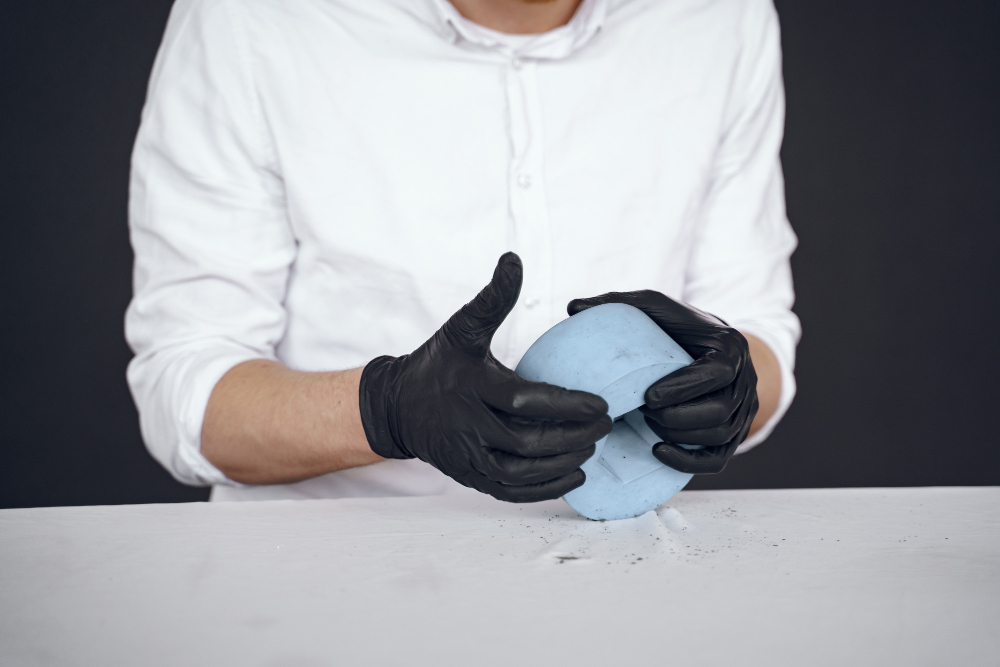Disposable Vinyl Gloves: A Comprehensive Guide to Choosing the Best Protection
Disposable vinyl gloves are an essential item in many industries, providing a protective barrier for workers and helping to maintain a clean and safe environment. However, with so many options available, choosing the right gloves can be a daunting task. This comprehensive guide will help you make an informed decision when selecting the best disposable vinyl gloves for your needs. We will cover everything from the benefits of vinyl gloves, to understanding glove materials, sizes, thickness, and applications. With this knowledge, you can confidently choose the right gloves to keep yourself and others protected.
1. The Benefits of Disposable Vinyl Gloves
 |
| Disposable Vinyl Gloves |
Disposable vinyl gloves offer a number of advantages over other glove materials. Some of the key benefits include:
- Cost-effectiveness: Vinyl gloves are often more affordable than latex or nitrile gloves, making them an attractive option for businesses looking to save on costs.
- Comfort: Vinyl gloves are soft and flexible, providing a comfortable fit for users.
- Low allergenic potential: Vinyl gloves are less likely to cause allergic reactions than latex gloves, making them a safer choice for those with latex sensitivities.
- Chemical resistance: Vinyl gloves provide a reasonable level of resistance to certain chemicals, making them suitable for use in some industrial applications.
- Easy donning and removal: The smooth surface of vinyl gloves allows for easy donning and removal, reducing the risk of contamination.
2. Understanding Glove Materials: Vinyl vs. Latex vs. Nitrile
When choosing disposable gloves, it's important to understand the differences between the three main materials: vinyl, latex, and nitrile.
- Vinyl: Made from polyvinyl chloride (PVC), vinyl gloves are a popular choice for food service, cleaning, and other light-duty applications. They offer a comfortable fit and are less likely to cause allergic reactions than latex gloves. However, vinyl gloves are not as durable or puncture-resistant as latex or nitrile gloves.
- Latex: Derived from natural rubber, latex gloves offer excellent flexibility, comfort, and dexterity. They are also highly durable and puncture-resistant. However, latex gloves can cause allergic reactions in some individuals and are not recommended for those with latex sensitivities.
- Nitrile: Made from synthetic rubber, nitrile gloves are highly durable and puncture-resistant. They also offer excellent chemical resistance, making them suitable for use in a variety of industries. Nitrile gloves are a popular choice for those with latex allergies, as they are latex-free.
3. Finding the Right Glove Size
Proper glove sizing is essential for ensuring user comfort and protection. Gloves that are too small can restrict movement and cause discomfort, while gloves that are too large can reduce dexterity and increase the risk of contamination. To find the right glove size, measure the circumference of your hand at its widest point, just below the knuckles. Use this measurement to consult the manufacturer's sizing chart and select the appropriate glove size.
4. Choosing the Appropriate Glove Thickness
 |
| Disposable Vinyl Gloves |
Glove thickness is an important factor to consider when selecting disposable vinyl gloves. Thicker gloves offer increased durability and protection, while thinner gloves provide improved dexterity and tactile sensitivity. The appropriate glove thickness will depend on your specific application and the level of protection required. Common glove thicknesses range from 2 mils (very thin) to 6 mils (thicker) or more.
5. Selecting the Right Gloves for Your Application
When choosing disposable vinyl gloves, it's important to consider the specific requirements of your application. Some factors to consider include:
- Level of protection needed: Consider the potential hazards in your workplace and choose gloves that offer the appropriate level of protection.
- Chemical resistance: If you will be working with chemicals, select gloves that offer suitable resistance to the specific chemicals you will be handling.
- Food safety: If you work in the food industry, choose gloves that are approved for food contact.
- Puncture resistance: For applications involving sharp objects or tools, select gloves with increased puncture resistance.
6. Ensuring Glove Safety and Compliance
When selecting disposable vinyl gloves, it's important to ensure that they meet the necessary safety standards and regulations for your industry. This may include compliance with the Food and Drug Administration (FDA) regulations for food contact, Occupational Safety and Health Administration (OSHA) guidelines for worker protection, or other industry-specific standards.
7. Allergens and Vinyl Gloves
While vinyl gloves are less likely to cause allergic reactions than latex gloves, some individuals may still experience sensitivities to vinyl. If you or your employees have a history of skin reactions to gloves, consider selecting gloves made from an alternative material, such as nitrile.
8. Evaluating Glove Durability
The durability of disposable vinyl gloves can vary depending on the manufacturer and specific product. To ensure you are selecting a durable glove, consider factors such as:
- Glove thickness: Thicker gloves generally offer increased durability and protection.
- Manufacturer reputation: Choose gloves from a reputable manufacturer to ensure consistent quality and performance.
- User feedback: Consult reviews or speak with other users to gather information on the durability of specific glove products.
Conclusion
Selecting the right disposable vinyl gloves is crucial for ensuring the safety and comfort of workers, as well as maintaining a clean and hygienic environment. By understanding the key factors to consider, such as glove materials, sizes, thickness, and application requirements, you can confidently choose the best gloves for your needs. Remember to prioritize safety and compliance, and always select gloves from a reputable manufacturer to ensure consistent quality and performance. With the right gloves in hand, you can focus on the task at hand, knowing that you are well-protected.






0 comments